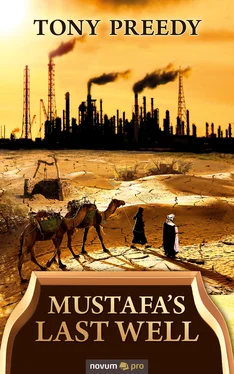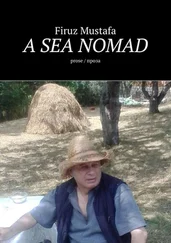Darkness fell again and he heard more animal activity, but it was the screech of birds fighting over the remains of his companions, he decided. Whilst it was cool, he slept a little but was awakened by cramp in his right leg, resulting he assumed from loss of salt to perspiration. Nothing he could do would relieve this new pain that compounded that from his chest, and again he lost consciousness. He came around when it was again hot, craving food and water. The oil that still felt wet but now cool on his cheeks still tempted him. A new sensation alerted him. The sand beneath was vibrating infinitesimally and he realised a panzer, no, several panzers, were responsible. His hopes were raised in the belief that his squadron was returning for him after defeating the British. Soon he could hear the engines, but they were not familiar and with dismay he realised it was the most likely victorious British avoiding mines by navigating in the tracks of his convoy. The sound grew louder as he resolved that they must find him. Rather their prisoner of war than a dehydrated flattened corpse, he thought. As he fought the pain, he filled his lungs with oily air, as far as the panzer above and sand below would allow. He waited, knowing that his shout would have to be audible above the din of machinery. Alas, that was as close as they came for the sound now diminished. Though it pained his ribs, he shouted as loud as he could but knew it was futile and he realised then that some ribs were broken.
Twice more the sun rose and set, and he went through the agony of daily roasting and nightly freezing, always fighting the temptation to lick the oil that surrounded his parched lips. He was losing body mass and realised that as he starved to death, he had the compensation of being able to move parts of his body, if only a few millimetres. With his free left hand, he started to scratch the sand until he was able to move his wrist. Then he could scoop sand with his hand. He found it tiring and painful but concentrated on the task to the exclusion of all else.
The boys found the tank after they first saw the birds hovering above and as they drew near, they were directed by the smell of the half-eaten corpses. They dismounted their camels, frightening the desert birds from their meal, and scurried down the dunes to the panzer and its corpses. With one hand they held their noses tight to reduce the offensive smell. With the other, they wafted away flies, cut away the wristwatches, identity tags, rings, purses and insignia of the Germans and placed their booty in the pockets of their robes. The boys took boots and hats and placed them in a camel blanket. One climbed onto the panzer and robbed the corpse of the driver, of a gold ring, by cutting off a bony finger that still gripped the throttle control.
Bernhardt felt the jolt as the boy descended inside. He stopped digging and listened, assuming it was a large animal. Then he felt a hand trying to remove his watch. Thinking he was in contact with something edible, he tried to grab it with his remaining strength, causing the boy to drop his knife. The boy reacted in shock, praying quietly to Allah, and then called in Arabic for his companion, who was now divesting the panzer of its stock of food and water. Bernhardt recalled the Arabic he had been taught before departing for Africa and beseeched the owner of the hand for help. His strength failed and the hand escaped. The other boy joined the “hand” and talked excitedly about “the live soldier,” as far as Bernhardt understood. He realised from their conversation that they were reluctant to help because he could tell their father about their thefts. One wanted to leave him but the other, who Bernhardt gathered was called Rashiid, wanted to help. Bernhardt surprised them when he spoke in Arabic, trying to convince them that if they helped to dig him out, he would not tell on them. He was relieved when it was apparent that they understood his limited Arabic. His despondency returned when the other boy, named Malik, still insisted on leaving him to die and was sure no number of men could ever move the tank.
Rashiid said, “We could tell soldiers about him.”
“We have not seen any for weeks,” replied Malik.
Whilst they argued, Bernhardt remembered the shovels strapped to the deck and begged the boys to use these with what he now feared was his last breath. Malik argued that it was not manly to labour with shovels, but Rashiid disagreed and shamed his friend into helping. As the boys shifted sand from beneath him, Bernhardt was able to wriggle, but attempts to assist the boys only caused the panzer to sink further into the sand. The pain from extra pressure on his chest caused him to lose consciousness again. The boys then thought him dead, and Malik was for leaving him, but Rashiid would not give way. After more arguments and many rests, the boys were able to drag the stinking German out into the sun. They poured water onto his lips, which revived him, and wiped the oil from his face. Eventually, Bernhardt managed to drink, but could not stand unaided.
Bernhardt’s Arabic improved rapidly when he realised the young Bedu understood no other language. He learned that he was now in British territory and that no Germans had been seen for a week. After feasting on the panzer’s provisions, the boys helped him on to a camel and set off towards their camp, apparently near the Egyptian border.
***
At the camp, which consisted of a large tent surrounded by chickens, sheep, and a few camels, he was taken to meet the leader, who was also Rashiid’s father. Bernhardt was welcomed and told that he would be able to stay and recuperate. The Bedu took his stinking, oil-soaked uniform and burned it. He was given an Arab robe and turban. Whilst he was still not fully conscious, the women of the camp used precious water and soap to wash him, marvelling at his fair skin, blue eyes and blonde hair. Thereafter he lived as they did, and took pleasure learning of their culture. He never forgot that he owed his life to the two boys, with whom he became great friends, and to Rashiid’s sister, who nursed him. When his ribs had mended, and he was fit to walk and look after himself, the Bedu taught him all they could about the flora and creatures of the sand and survival. They made him earn his keep by tending first their hens and, as he became stronger, their sheep, a task that required only that he sit and watch in case they strayed out of sight. He took the opportunity to explore his surroundings and to become proficient in their language.
After two months, when he was fully recovered, the leader told him that he must now be handed over to the British because they were to move west in search of new grazing. Bernhardt was reluctant to leave, fearing that without a uniform he would be taken for a spy and possibly shot. However, he was accepted as a prisoner of war after the Bedu showed the British soldiers his tank and told them how he was found. On Bernhardt’s insistence, the British agreed to formally bury the, now bleached bones of his crew.
The two boys had mixed feelings when their friend departed but they were at least grateful that he had not divulged their secret. They had feared that if he remained, he may one day use his knowledge against them. Rashiid’s eldest sister was the most disappointed when her blue-eyed patient was taken from her. The German and his nurse, of whom he had seen no more than eyes, feet and henna decorated hands, were each conscious of the un-Islamic feelings that were developing between them. The would-be young lovers parted, each determined never to forget the other.
Chapter 5
Trucial Arabia, year 1367 Hijri: AD 1948
They had watched the grey ship approach their favourite spot on the sandy shore, washed by the blue waters of the Persian Gulf. It had passed many times over the past week. Today it had come close enough for her to see the men in their white uniforms standing on the deck. The ship, from which a small boat was being lowered into the sea, was now held by a chain. She knew every type of shell on that beach and had collected each in different sizes and with various coloured patterns to decorate the walls of her little room. Nahla, now seven years old, had been lonely ever since her two brothers had departed to schools in Europe a month ago. She missed her brother Saif, but not the older, teasing Moosa, who she loathed more than ever since he had killed her pet. Moosa habitually made the sound of a bee whenever he wanted to annoy Nahla, for that was what her name meant. Both boys were her stepbrothers, born to her father’s first wife, Layla, who had earlier borne three daughters before Moosa, but the older pair had been given in marriage to their cousins soon after they started puberty, Layla said. Layla’s third daughter, Fousia, who was many years older than Nahla, still lived in the harem, which Layla dominated. Layla was now beyond her menses and barren, she once confided to Nahla, but this meant nothing to her. Now Nahla’s only male company, and that definition was questionable, was Ali the eunuch, who doted on her like a mother hen with a solitary chick.
Читать дальше












